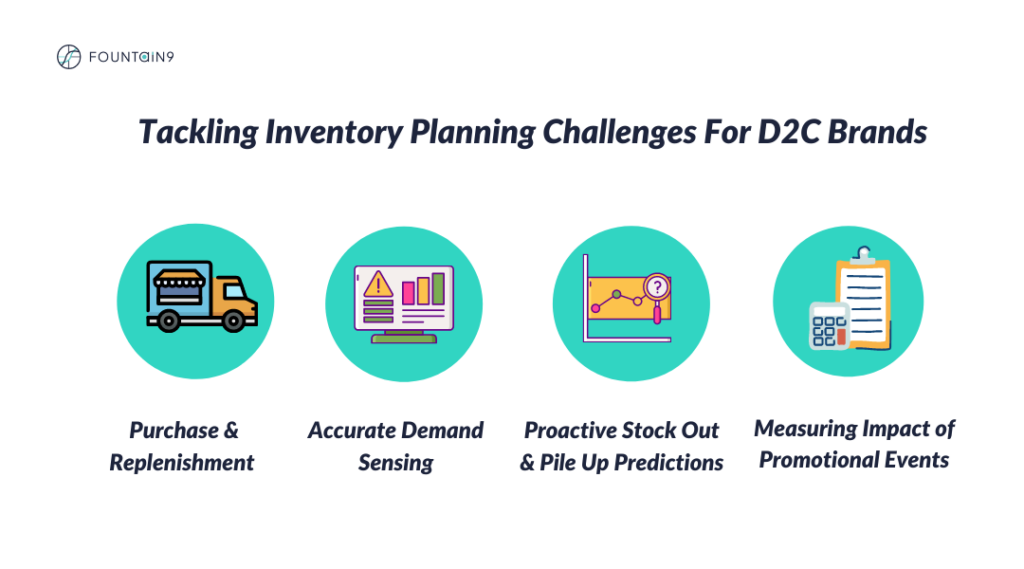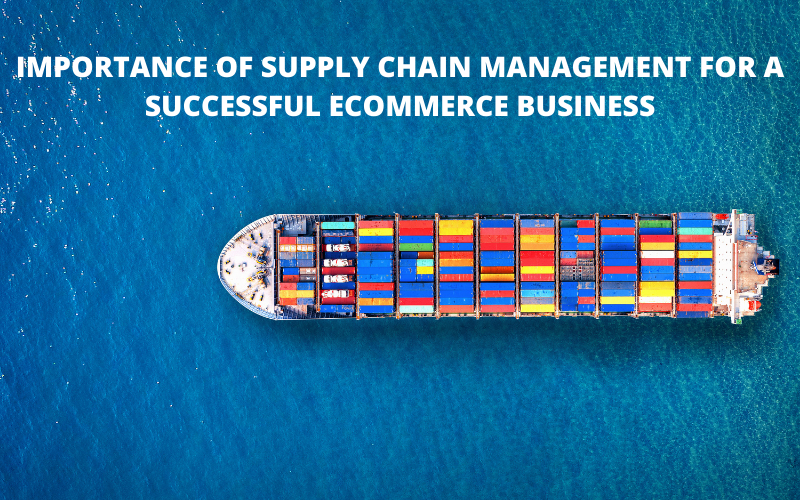A well-oiled eCommerce supply chain management system is an underestimated superpower for online businesses. If you want to sell online successfully, you need to optimise your supply chain.
But how much do early-stage eCommerce D2C brands really know about this? Here is the perfect guide for you to get started!
What is an eCommerce supply chain?
An eCommerce business refers to the buying and selling of goods or services over the Internet.
An eCommerce supply chain is the network of people/technologies that execute this transaction successfully.
The entire network is responsible for ensuring the customers get what they want on time. It consists of producers, suppliers, transportation companies, warehouses and distributors.
Each section of the network functions in a logical sequence. At every stage of the supply chain, there is an independent team working.
Imagine if your shipping partner suddenly decides to not deliver on time, or if your vendors give you rotten material; you will not be able to meet your customer’s needs.
An error in one section of the supply chain has ripple effects through the entire chain.
As your business grows, you would need to develop an effective eCommerce supply chain management system to ensure your supply chain can thrive.
What is it and why does it matter? Read on to find out.
eCommerce supply chain management
This refers to managing and overseeing all parts of the supply chain.
You need to plan, coordinate, schedule and control numerous things at the same time. Your priority should be to ensure that the right product reaches the right customer at the right time.
To understand supply chain management for your small eCommerce business, here is a quick guide on its components.
Components of eCommerce supply chain management
Planning
At the very beginning, an eCommerce business owner needs to have a well-structured plan. There can be multiple variables that can have an unforeseeable impact on your final product and timelines.
This is where demand forecasting comes into place. Unless you have a rough idea of how many products your customer will want, you will not be able to determine raw materials, shipping costs, delivery time, etc.
Try not to invest in anything until you have a long-term working plan ready.
Your planning should include
- Budget
- List of vendors
- Cost comparison between vendors, shipping partners
- Timelines of deliveries
- Payment options
- Cost and revenue plans
Having a detailed business plan before you launch your business can help you stay consistent and structured.
Sourcing
If an overarching plan is ready, the next step is actually getting started on what your customer needs.
You need to build your inventory, and for that, you need relevant resources. You will need to have a network of vendors that you can trust.
This is the stage when you can optimize your costs by choosing the right vendors or suppliers. Choose suppliers that can give you raw materials that are affordable and also of good quality.
Ultimately, the key is to obtain optimal quality products that ensure the customer’s highest satisfaction.
Here are a few guides for a detailed overview –
- A complete guide: How to sell food online in India
- Step-by-step guide: How to sell stationery online in India
- How to sell clothes online in India: With live examples
- How to sell art online in India and make money easily: With LIVE examples and tips
Inventory management
Let’s discuss why inventory management forms a crucial part of eCommerce supply chain management. It is important to know WHAT resources are needed for the product, how much is needed and by when will they be needed.
Knowing how many products need to be in storage will depend on your knowledge of the current demand for that particular product.

It goes without saying that storing too much or too little will affect your business’s bottom line. Too much could result in wastage or spoiling of the product and too little would mean customers shift to other online stores while hunting for what they need.
A successful eCommerce business owner can manage inventory in accordance with consumer demand while staying in line with manufacturing timelines.
On Instamojo, you can specify different order units (SKU), add shipping information, minimum and maximum stock units, invoicing, and later, keep track of order status while adding a product to premium and free online stores.
Set up inventory management for your independent online store.
Logistics and shipping
Once your vendors are decided, there are multiple other decisions that need to be taken.
How will the raw materials reach you? Once you have the goods ready, how will they reach the customer? Where will they be stored?
Managing all of these things is together known as logistics. Under logistics management, you have to oversee:
- Suppliers and vendors are providing you with the best possible resources
- Storage options (At home or choosing warehouses)
- Shipping and courier services that are affordable and efficient
- Last-mile delivery
- Return of the products if the customer is unsatisfied
A survey done by Investp showed that between the age of 18-36, 56% of eCommerce customers want same-day delivery and 80% of all online shoppers expect same-day shipping.
To achieve this level of efficiency, eCommerce business owners need to have a bird’s eye view of their entire logistics.
Returns
If the customer is not happy with the product they ordered online, they would want to return it. For D2C eCommerce brands, having a plan of action for such situations is crucial for long-term success.
A customer’s degree of satisfaction is directly impacted by the efficiency of the return process.
Related read: What destroys the trust of customers online (and builds it + a free report)
Why is supply chain management important for an eCommerce business?
1. Higher efficiency rates
A dedicated eCommerce supply chain management system can help you cut down on your losses and improve your brand reputation.
First, supply chain management can help you forecast demand.
For eCommerce business owners understanding market demand is extremely important as that will decide everything from costs on procurement to delivery timelines and strategies.
Additionally, a good supply chain management system would also increase overall productivity and efficacy along with ensuring higher ROIs for small businesses.
You are at risk of losing customers if there are delays in deliveries because of logistical errors, shipment delays and inefficient order management. This can be avoided if you have a strong and trustworthy network of vendors, suppliers and distributors.
Constant communication, feedback, and transparency in the supply chain can foster stronger relationships with different stakeholders.
Related read: Customer experience: Still a growth driving factor for eCommerce businesses
2. Improved financial performance
As an eCommerce business owner, your main goal is to maximise profits while guaranteeing customer satisfaction. For this, you need to be aware of all cash outflows.
The benefit of supply chain management is the ability to see far ahead into the future to predict potential areas where there can be monetary losses. Having a well-designed supply chain management allows you to understand where you can optimize your costs by streamlining certain processes.
Improve your profit margins by:
- Evaluating the performances of each component using big data analysis
- Avoiding unnecessary stockpiling in your inventory
- Shortening product life-cycles
- Exploring new ways of making profits
- Balancing costs and output from all assets
Related read: What is an emergency fund and how to build it for your eCommerce business?
3. Higher visibility for risk management
We learnt how a supply chain management system can help you grow revenues for your eCommerce business, now let’s discuss why it’s important for emergencies too.
Building a good supply chain management system helps build agility and resilience for your small eCommerce business. It gives you visibility over the entire network in the supply chain giving you the ability to critically evaluate the larger picture as well as its microelements!
This attention to detail can help you look out for possible threats and minimise them in advance. You have more control over your eCommerce business operations and in turn – your revenues. This includes having backup suppliers, vendors and other risk mitigation measures ready.
It is usually in our best interests to not lose out on a major chunk of your revenues, this is why every online business should create an emergency fund for troubled times.
Related read: 5 actionable growth ideas from the ex-Head of Growth at Licious & MilkBasket
4. Better customer relationships
A major benefit of eCommerce supply chain management is that it helps online store owners build stronger customer relationships.
Even though customer satisfaction is key for any type of commerce, it takes even more centre stage for D2C brands. Their entire market strategy depends upon direct customer feedback and relationships.
As D2C eCommerce brands grow, it can become extremely mundane and risky to manually handle all the customer data. This is why they should invest in customer relationship management (CRM) systems.
CRM is a technology-based solution that helps you:
- Automate your marketing
- Manage sales
- Store and manage customer data
- Track your customers buying history to understand their needs
- Predict demand
A good CRM can act as a booster for your eCommerce supply chain management by:
- Facilitating deliveries on time
- Resolving customer queries or complaints quickly
- Having an efficient return process in place
- Helping you adapt to changing market conditions and needs
This results in the customer feeling appreciated and in turn increase customer retention.
At Instamojo, we understand the importance of good customer service and management. Our free online store comes equipped with robust CRM features that you can use to track customer data and improve your sales.
In a dynamic eCommerce environment, customer demands are always changing and you need to stay on top of these demands. Also ensure your whole supply chain follows the values of morality, ethics and sustainability.
This is going to be a strong factor for success in 2023.
Create your free store on Instamojo to get access to multiple features that help you control and manage every section of your supply chain independently!


